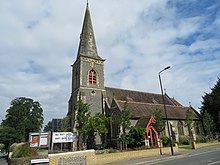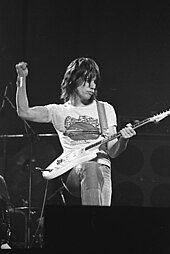|
Wallington, London
Wallington is a town in the London Borough of Sutton, South London, England, 9.7 miles (15.6 km) south-west of Charing Cross. Before the Municipal Borough of Beddington and Wallington merged into the London Borough of Sutton in Greater London in 1965, it was part of the county of Surrey. Wallington is a post town in the SM postcode area. HistoryThe name "Wallington" derives from the Anglo Saxon "Waletone", meaning "village of the Britons". Wallington appears in Domesday Book of 1086 and was held by William the Conqueror. Its domesday assets were: 11 hides. It had 2 mills worth £1 10s 0d, 11 ploughs, 8 acres (32,000 m2) of meadow. It rendered £10.[3] The historic village was situated somewhat to the north of the current town centre around what is now Wallington Bridge over the River Wandle. At the time of the Domesday book there were two mill ponds. The mill buildings have long been demolished, but the mill pond survives as The Grange boating lake. In the 1860s one Alfred Smee, surgeon to the Bank of England, constructed an elaborate garden on the north side of the Mill Pond, and wrote an illustrated book called "My Garden" in 1872.[4] What was then called "Carshalton" railway station was opened in 1847 in the open fields to the south of Wallington because the owner of Carshalton Park objected to it being built near to Carshalton village. This acted as a spur to the development of the area and in the 1860s Nathaniel Bridges created a prestigious housing estate of gothic revival villas (architect E. L. Brock). To provide a church for the estate, Bridges sponsored the construction of Holy Trinity, and Wallington became a separate parish in 1867. The area around Holy Trinity Church is known as Wallington Old Town. In particular Clifton Road, Belmont Road and Park Road exhibit some imposing Victorian and Edwardian villas. This southward development continued towards Woodcote and by the time of the First World War the section of Woodcote Road to the south of the station had become the new High Street. Wallington High School for Girls was established in 1888 by a collective of nuns.  Wallington Methodist Church was built in 1908 on a site in Beddington Gardens in the town centre. Since 1902 the town has maintained the tradition of an annual crowning of the Wallington May Queen. The event begins with a procession through the town. Girls join the group at the age of three as "fairies", before graduating to "attendants to the May Queen" a year later. They then go on to become crown bearers before taking on the role of banner bearer. The girls then act as "princes", and become eligible to be a May Queen at the age of nine.[5] The Municipal Borough of Beddington and Wallington was incorporated in 1936 from the former Beddington and Wallington Urban District. Wallington Town Hall (architect Robert Atkinson) and public library were built in Wallington town centre in the 1930s, as was the fire station in Belmont Road. Wallington County Grammar School (for boys) was opened on London Road, close to Beddington Park in 1927.  Wallington was an important centre for the production of lavender oil until about the time of the First World War. Lavender and herb growing were very prominent in the area in Victorian times and much earlier, and extensive fields of lavender were to be seen in the Carshalton, Beddington and Wallington areas. Lavender growing was a very prosperous part of the local agriculture hereabouts in the 19th and early 20th centuries. In Wallington the area to the north of the station was chiefly used. The scale of the operation can be understood from the fact that the Daily News in 1914 was able to state that at nearby Carshalton Beeches "In every direction the low hill sides of the farm beyond Beeches Halt are swept with the bloomy pastel tint of the lavender flowers". The importance of lavender is remembered and commemorated in a number of ways, for example:
 Many of Wallington's young men served and lost their lives in the First World War, and in 1922 a memorial was unveiled on Wallington Green by General Edmund Elles to commemorate the fallen. The memorial was altered in 1949 to include the names of the locals who died in the Second World War. The memorial is in the form of a Portland stone obelisk on a plinth, with a cross and a sunburst motif. On the sides are bronze plaques bearing the names of the fallen. It stands on blue Staffordshire engineering bricks and York stone. In 2005 it was discovered that the memorial was being attacked by moss, and English Heritage paid for its restoration.[6] The inscription reads:
TodaySince 2007 new retailers have opened in Wallington, including Tesco Express and Caffè Nero. These were in addition to existing retailers including Sainsbury's, Boots, W.H. Smith, banks, estate agencies and building societies.[citation needed] There have been two developments of luxury flats opposite the railway station, which were completed circa 2010 and 2013 respectively. More town centre flats in Shotfield Road were completed in 2015.[citation needed] A farmers' market is held on the second Saturday of each month. This is usually located outside the old town hall, but occasionally in the car park at Shotfield.[citation needed] Sutton Community Farm, the only one of its kind in Greater London, is located in Wallington. A not-for-profit social enterprise, it occupies a 7.5 acre small-holding of a type originally given to ex-servicemen following the First World War.[7] There is a public library in the centre of Wallington in the "Shotfield" district; it has an outside terrace where coffee and tea are served. Shotfield is also where the former Town Hall, and now a college, is located. In 1980 it was taken over and converted into a Crown Court. The building ceased to be a Court in April 1999, and was later converted to its current use. The town saw the opening of a small independent cinema in May 2014 at the Brook Cafe and Bar, along with a recording studio.[8][9] The Shotfield area of the town centre gained a modern new health centre in 2012, replacing smaller existing facilities on the site.   Holy Trinity Church  Wallington's parish church is located on Manor Road, and dedicated to the Holy Trinity. It was designed by Habershon and Brock, and completed in 1870. It has been Grade II listed since 1974.[10][11] The ancient Chapel of Wallington stood on a site to the north of the London Road, behind the brewery in the grounds of the Elm Grove Estate, and was demolished about the year 1791. A deed dated 1480 gives the information that the dedication of the chapel was to Our Lady of the Moor. The foundations were discovered in 1921, and with them some carved stones which were parts of windows and arches. The remains of the vanished Chapel may be seen in the walls of the Church Hall in Elm Grove and the more recent Church of St. Patrick.[12] The present Church of Holy Trinity was erected in 1866 by Mr Nathaniel Bridges, Lord of the Manor. The Church was consecrated on 28 September 1867, by Bishop Sumner of Winchester. Like the rest of the historic county of Surrey, the parish of Wallington at that time was in the Diocese of Winchester. It was later transferred to Rochester, and when the current Anglican Diocese of Southwark was formed, it was transferred to it.[12] The church was built to resemble the description of the old chapel – after the style of the 14th century. The west window of the south aisle is similar to one in the Church of Little St. Mary's Cambridge, which was erected about 1850. Each window has tracery of a different pattern. The stone used with the flints is Bath stone. The roof and floor are covered with Broseley tiles. The height of the spire is 110 feet. The interior of the church gives an area of 105 feet long by 75 feet broad, and gives sitting accommodation for 650 persons.[12] Since the Parish Church was built it has been adorned with several stained glass windows. Those on the south side are memorials to former worshippers. The central window in the chancel is a memorial to the Rev. John Williams, the first vicar. The north window was presented by the relatives as a memorial to those who fell in World War I, while that in the south side is a gift of the parishioners as a War Memorial.[12] In 1926 the chancel was entirely refurbished, with new Communion Hails – the gift of Mrs Bund, in memory of her husband; a new pulpit – the gift of Mr W. J. Mallinson; a brass eagle lectern – the gift of Mrs Cleverly; marble and alabaster baptismal font – the gift of Mrs Page; oak panelling in the chancel and sanctuary and new oak doors and vestibule at the south entrance – the gifts of members of the Landon family and Miss Roche; and new choir stalls (the cost of which was defrayed by subscriptions) were added to the Church.[12] Open space Parks in the Wallington area include Mellows Park, Beddington Park and the Grange Gardens. The latter two, through which the River Wandle flows, lie in the north-east of the area, on the border with neighbouring Beddington. Beddington Park is nearly 100 acres in size and is maintained by the London Borough of Sutton. It was originally part of the Deer Park attached to Carew Manor, a grand country house built in the Tudor period, which stands to this day. It comprises a large area of open grassland with small clumps of trees, with an area of more formal gardens near the Grange restaurant, as well as a lake and pond. The main lake in the south west of the park was originally a mill pond. There are many paths and a number of ornamental bridges, which cross the stream which feeds the lake: this is part of the River Wandle, and the park is on the Wandle Trail. Part of the park is managed as a wildlife site. TransportWallington is served by rail, bus and coach connections. RailServices operate from Wallington to Victoria and London Bridge via West Croydon and to Epsom Downs and Epsom via Sutton and beyond. BusBus services are available from Wallington: 
CoachNational Express services no longer travel through Wallington. BicycleNational Cycle Route 20 travels in a north–south direction on the edge of Wallington connecting cyclists with Wandsworth on the River Thames and Brighton on the South Coast Notable people
Sport and leisureWallington has a Non-League football club called Carshalton Athletic and many social clubs.The town has four gold post boxes commemorating local resident David Weir's four gold medals at the 2012 Summer Paralympics. Education Primary education
Secondary education All three secondary schools are highly rated grammar schools, with one (Wilson's School) being one of the highest achieving state schools – including all state grammars – in Britain.[citation needed] See the London Borough of Sutton article for further details of education in the borough. References
External links
|
||||||||||||||||||||||||||||||||||||||||



